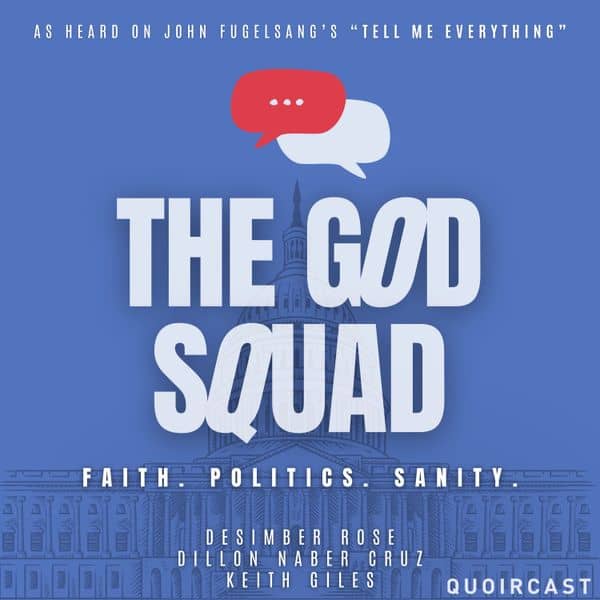
We live in an anxious time. It appears that more people are battling anxiety than ever in the history of the world. Perhaps part of that anxiousness is rooted in the fact that much of the world has moved away from faith in God and, thus, we are left to our own devices—and none of us are sufficient to navigate this challenging world alone. Divine assistance is needed now more than ever.
Some who are “faith filled” are inclined to tell those who struggle with anxiety that they should just “have faith” or simply “trust in God.” While having faith is important, and though trusting in God is essential, it doesn’t always help to tell someone who is battling uncontrollable anxiety that they just need to “have more faith.” The question seems to be “How do I have more faith?” “How can I trust more fully in God?”
There is a great deal in scripture that discusses having an anxious soul and how to navigate those waves of anxiety that come upon even the most faith-filled of us. What follows is but a sampling of the many bits of inspired counsel on living a peace-filled, anxiety-free life. While we will focus first on the Christian New Testament, we will also look at what the Jewish, Islamic, Hindu, Sikh, and Confucian texts have to say about anxiety and how to navigate it.
From the Christian Canon:
Matthew 6:27—“Can any of you add a single hour to your life by worrying?” (God’s Word Translation)Luke’s version of this same saying is: “Can worry make you live longer? If you don't have power over small things, why worry about everything else?” (Luke 12:25-26 Contemporary English Version)In essence, Jesus is saying that we need to learn this one truth, as anxious as we feel about something, worrying about it never fixes it. Modern science tells us not only does worrying not “add a single hour to our lives,” it actually shortens our lifespan, as it puts undue stress on our various organs. So, stop your worrying! It is counterproductive, and it is illogical because it places undue focus on the very things we have no power to control. Thus, how does it help us? It never does!
Matthew 6:34—“Don't worry about tomorrow. It will take care of itself. You have enough to worry about today.” (Contemporary English Version) In this same sermon, and only a few verses later, Jesus suggested that we should focus on the now, and not get caught up in worrying about the future. You can’t actually address the future until the future arrives, but you can work on the present right now—and staying present is one way to push off the anxiety of what “might be” down the road.
Matthew 6:25—“Therefore I tell you, stop being perpetually uneasy (anxious and worried) about your life, what you shall eat or what you shall drink; or about your body, what you shall put on. Is not life greater in quality than food, and the body far above and more excellent than clothing?” (Amplified Bible)Here Jesus reminds us that so much of what we worry about is not worthy of our stress. Your life and health are much more important, He tells us, than what you eat or wear; and much that we stress about does damage to our life and heath while being unimportant in the eternal scheme of things.
Romans 8:38—“And I am convinced that nothing can ever separate us from God’s love. Neither…our fears for today nor our worries about tomorrow.” (New Living Translation) Paul’s point is simply that all the things that make you anxious—no matter how they turn out—will not cause God to stop loving you. He cares about you in spite of your failings and challenges, and He’s not a God who discounts the value of people because they are fearful, unsuccessful, or anxious. Paul wants his hearers to believe that truth, which is why he says, “I want you to be free from anxieties.” (1 Corinthians 7:32 English Standard Version)He strongly felt that his counsel, if followed, could lead to a lifting of anxieties. Thus, in Philippians 4:6, Paul advised: “Don’t be anxious about anything; rather, bring up all of your requests to God in your prayers and petitions, along with giving thanks.” (Common English Bible)Paul’s counsel here is wise. Rather than getting anxious about things, go to God, talk openly about your challenges and fears, and (during those prayers) list your blessings, giving thanks for them. As you run through your mental list of blessings, expressing gratitude to God for all that you have and are blessed with, it will actually lift much of the anxiety you feel.
1 Peter 5:7—“Throw all your anxiety onto Him, because he cares about you.”(Common English Bible) While this may be easier said than done, Peter tells us that Jesus is willing to take away the things we most worry about. Of course, we have to be willing to relinquish those things. We need to ask the Lord to take them from our minds and hearts, and then let go of them—so that He can do just that. Perhaps Peter learned this truth from Jesus Himself, who taught: “If you are tired from carrying heavy burdens, come to me and I will give you rest.” (Matthew 11:28 Contemporary English Version)
2 Timothy 1:7—“For God did not give us a spirit of timidity or cowardice or fear, but He has given us a spirit of power and of love and of sound judgment and personal discipline—abilities that result in a calm, well-balanced mind and self-control.” (Amplified Bible) The apostle’s point is that fear doesn’t come from God, it comes from the devil. God’s Spirit causes us to feel confident and loved. Satan’s spirit causes us to be timid, fearful, and cowardly. As we follow the guidance of the Spirit, we will have good judgement, and that—according to Paul—will help us to have a “well-balanced mind,” including the ability to “control” our anxious minds and hearts.
John 14:27—“Peace I leave with you. My peace I give you. I give to you not as the world gives. Don’t be troubled or afraid.” (Common English Bible)Here Jesus points out that He can bring us peace—lasting peace. What He offers is not the same as what the world offers. However, if we are willing to let go of our troubles and fears, he can cause us to feel a sense that everything is going to be okay, regardless of the outcome of that which we’re stressing about. Part of how He does that is by reminding us that the things of this fallen world are temporary and fleeting. However, if we focus on Christ and His ways and will, then our troubles and fears will dissipate because we will no longer be distracted by the disquieting ways of this world.
Hebrews 13:6—“We can confidently say, ‘The Lord is my helper, and I won’t be afraid. What can people do to me?’” (Common English Bible) Honestly, if God is on your side, does it matter what the world thinks or does? Oh, the wicked can certainly bring tribulations into your life, but even those are temporary. Have confidence in God’s utter and unquenchable power. Don’t be afraid. All the stuff that gives us anxiety will last for a small moment, and then it will be gone, and you and I will be redeemed from this anxiety-laden world.
Philippians 4:13-14—“Christ gives me the strength to face anything. Nevertheless, it was good of you to help me when I was having such a hard time.” (Contemporary English Version) The words of Paul here remind us that Jesus can empower us to overcome most of what makes us anxious. However, surrounding ourselves with good, caring, loving friends and family can also be a benefit. They can buoy us up when we are feeling down, anxious, or overwhelmed. Thus, Paul says we should trust that God can help us to have the strength to “face anything.” Yet, he also seems to imply that God may very well equip us by placing around us good and loving family and friends who can help lift our burdens and lessen our anxieties. So often, it is through others that God answers our prayers.
Well, more could be said with regards to what the New Testament teaches about anxiety and obtaining the Lord’s peace, but let’s now turn our attention to the canonical books of other world religions to see what they might add to this discussion.
From the Jewish Canon:
Proverbs 12:25—“Anxiety in a person’s heart weighs it down, but a good word cheers it up.” (Christian Standard Bible) Much like the teachings of Paul, King Solomon informs us that (when we are anxious) the kind words of others can lighten our burdens and cheer our heats. As an application, the “good word” found in the Bible can have this same affect, if we’ll study it in times of stress or anxiousness.
Psalm 94:19—“Whenever I am anxious and worried, you comfort me and make me glad.” (Good News Translation) Here the psalmist says that, when he is anxious or worried, the Lord God is able to comfort him and give him reason to be glad. In the case of the psalmist, God often did this through the singing of uplifting music. This technique may well be something you too would benefit by.
Isaiah 35:4—“Say to those who have an anxious heart, ‘Be strong; fear not! Behold, your God will…come and save you.’” (English Standard Version) While the prophet Isaiah was anxious himself, specifically about his people and their unfaithfulness to their God; nevertheless, here he reminds us that God can save those with “an anxious heart.” He can save us from the things that threaten our wellbeing, but He can also save us from our own minds, which rain down upon us worries about so many things. As one pastor constantly admonished his flock, “Look to God and live.” Thus, the psalmist advised, “When the righteous cry for help, the Lord hears, and delivers them out of all their distress and troubles.” (Psalm 34:17 Amplified Bible) And “Cast your burden on the Lord, and he will sustain you; he will never allow the righteous to be shaken.” (Psalm 55:22 Christian Standard Bible)
Jeremiah 29:11—“I know the plans I have in mind for you, declares the Lord; they are plans for peace, not disaster, to give you a future filled with hope.” (Common English Bible) The Hebrew Prophet Jeremiah records an important saying of the Lord. In this verse, God essentially says, ‘I’ve got a plan for your life, and that plan does not include anxiety or disaster. Rather, it is a plan filled with peace, hope, and blessings.’ I fear that some of us, regardless of our religious tradition, live in fear of God, and forget that His “plan” for us always has been and always will be a life of happiness and peace. However, he is well aware that some of us do all that we can to screw that up. Here, He simply reminds us that He has a better plan for our lives than the one we have and, when we’re anxious, it’s because we are focused on our own “plan”—and that personal plan is absolutely a disaster. So, no wonder we’re anxious. Trust God and quit trying to do it “your way.” If you’ll focus on His plan, the peace and hope will come, because everything He sets out to do, He succeeds at.
From the Islamic Canon:
While there isn’t a ton in the Qur’an—the holy book of Islam—which deals with anxiety, there are actually a couple of verses which are instructive. In one passage, God says, “Indeed, mankind was created anxious.” (Qur’an, Sūrha 70:9) In essence, He is saying that part of the fallen nature we inherit at birth is an anxiousness, a fear that we have to learn to overcome. And how do we overcome that? Well, the Qur’an explains that as well.
In the 13th Sūrha (or chapter) of the Qur’an, we are told: “Verily, in the remembrance of Allah do hearts find rest.” (Qur’an, Sūrha 13:28). In other words, if each time we feel anxiety we’ll think about God, peace will come into our lives and fill our hearts. But the key is to recognize when we’re anxious and turn our thoughts immediately to Him.
Additionally, in Sūrha 94, God says:“Indeed, after hardship there is ease.” (Qur’an, Sūrha 94:6) In other words, God is saying that this life is a test. God allows us to have a variety of experiences—challenging experiences—to see what we will do with those and how we will let those develop us. However, after each “hardship” or anxiety-producing trial, the Qur’an suggests, God will bring “ease” by helping us to see that things were not as bad as we allowed ourselves to think they were—and by helping us to feel the release of the stress at having made it through what initially seemed like an insurmountable challenge. In essence, this verse of the Qur’an is just reminding us that life is filled with temporary tests, but they are indeed temporary. The “ease” and peace that you seek is just around the corner, so don’t give up.
From the Hindu Canon:
The Bhagavad Gita is one of the most commonly read of Hindu scriptural texts. (It is also considered scripture by Hare Krishnas; a sect that broke off of Hinduism in the mid-twentieth century.) The “Gita” (as it is often called) makes this declaration about anxiety: “Those who are not a source of annoyance to anyone and who in turn are not agitated by anyone, who are equal in pleasure and pain, and free from fear and anxiety, such devotees of Mine are very dear to Me.” (Bhagavat Gita 12:15) We learn a couple of important truths here. First, “annoying” people are often filed with “fear and anxiety.” Perhaps that’s not surprising. Thus, if we’re anxious, perhaps we might ask ourselves, could this anxiety be rooted in some behavior we have that causes others “agitation” or distress? Second, we become dear to God (in Hindu thinking) when we do not live lives of annoyance, and when we do not allow the behaviors of others to “annoy,” “agitate,” or cause us “fear and anxiety.” In essence, the Gita is saying that a focus on God and not on the annoying behaviors of those who are not Godly is a good way to avoid personal anxiety, while also pleasing the Divine.
From the Sikh Canon:
Sikhism is the most modern of all the religions we have considered in this look at anxiety and how scripture speaks of it. In the Guru Granth Sahib (or holy book of the Sikh tradition) it speaks of what a practitioner of Sikhism tries to remember when he or she is feeling anxious: “In all four directions God is pervading; In all four directions…His Light spontaneously illuminates—He is…ever-present in all beings. God destroys the pain of birth and death. He is the Embodiment of Mercy. God is part and parcel of all; His Grandeur will never vanish.” (Sri Dasam Granth Sahib Ji – Ang 32) Essentially, the Guru Granth Sahib is saying that when you feel anxious or overwhelmed, remind yourself that God is present. He is all pervading. He can destroy the pain your anxiety causes you, and He will do so because He is a merciful and loving being.
From the Confucian Canon:
Finally, the sixth century BCE Chinese philosopher, Confucius—so famous for his pithy philosophical sayings—explained at least one cause of anxiety. He taught: “The Master said, ‘The virtuous man is free from anxieties.’” (Confucian Analects 14:28) Confucius’ use of “virtue” here has a broader meaning that just “morality”—something we often equate with “virtue.” For Confucius, “virtue” meant “ethics.” Essentially, he was saying that those who live ethical lives have nothing to fear and will not suffer from debilitating anxiety. Knowing that their lives are ethical, mortal, virtuous, and honest to the core, they have little to stress about. Living a life of ethics, Confucius taught, slays the anxieties so common in our day.
Conclusion:
While anxieties are rampant in this era of chaos, the various traditions of the world offer good counsel on ways of dealing with it; on how to not be overcome by it. One additional layer, not specifically delineated in our verses for today, but presupposed by them is this: all of that which God inspires can help eliminate anxiety. While God is understood to be the inspiration behind sacred scripture, He is also the source of inspiration behind the invention anti-anxiety medications and even the source of inspiration for good therapists. Thus, while one may draw on the word of God for guidance on how to overcome anxiety, God has also inspired and given trained professionals to help us navigate this anxiety strewn life. Thus, one may need to sup deeply not only from the words of God, and inspired teachers, but also inspired therapist and medical doctors as well—because, as the apostle Paul declared, God wants “you to be free from anxieties.” (1 Corinthians 7:32 English Standard Version)
12/14/2023 12:13:20 AM











